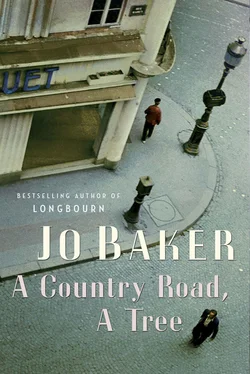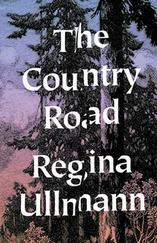“What?” Suzanne says.
“I insist.” Jeannine says.
“Others will need it more.”
“Have you gone quite mad?” Suzanne asks. “Have you not noticed how things are for us?”
He doesn’t look at her.
“That priest screwed us for thousands,” Jeannine is saying. “This is an apple and an egg in comparison. Take it, please. I’d give you more if I could, but I need to keep some in reserve, for the others.”
The patron says, “I can give it a good home.”
“Here.” Suzanne reaches for it. “Thank you.”
Jeannine passes the cash to Suzanne, who fumbles it into her bag. He looks away, uncomfortable.
“Thank you very much,” Suzanne says.
“Well.” The patron draws up a chair, drops his tobacco pouch beside the plate. He nods at it. “Go ahead, help yourself. Roll up a couple to take with you. We’d better get our plans in place.”
—
Their footfalls clip along the empty street.
“She was offering us the money; she wanted us to have the money; we need the money and yet you refused to take it.”
“Softly, please.”
She tugs at his elbow. “You know how things are for us. You must have noticed. This is not easy. This is not — good.”
“It had not escaped me.”
“What is it? Why can’t you let yourself be helped? Why do other people deserve your help and you won’t let them give you anything?”
He blows out a long breath. He says, “What do you think happened to him?”
She stops dead in the road. “What?” But he continues on with that long lope of his, and she has to break into a trot to catch back up with him. “Who?”
“The boy.”
“What boy?”
“The boy on the train,” he says.
“Those little fellows with their mum? I don’t see why anything—”
“No, no. The woman on the train, the talking woman — the one who just kept talking. She was talking about him. About the boy. Her son.”
He has stopped in his tracks now. She has to turn back to him. He is just a grainy shape, unreadable. “Oh,” she says. “Her.”
“D’you think he’s dead?”
Her own heartbeat is a thick throb, making the darkness pulse. “I don’t know.”
She steps up to him and pulls him close, and holds him a long moment. Bones and flesh and long-worn threadbare clothes, the smell of unwashed bodies and the cold of the night on their skin, and the gritty tiredness of not being young any more, and the brief warmth held between them. Then he pulls away. And they walk on.
—
“Are you certain?”
He glances at his watch. He lifts it to his ear. He listens to the tick-tick-tick-tick-tick. He winds it anyway, glancing around. The sun is setting again; the sky is flushed with orange over there, in what must be the west. And it’s getting cold.
“It looks more like, I don’t know, a shrub.”
“It’s a tree. It’s a willow. He said a tree, a willow.”
“It’s half-dead.”
“Yes. It is. It’s a half-dead willow.”
There’s a wide verge, which rises to become a bank, and at the top of the bank a fence runs; the tree forms part of this fence, like a post that’s taken root and grown. Bleached roots claw down into the earth; above, the trunk is slender, and two slim boughs stretch up to form a Y. A few blunt twigs, a handful of leaves. It is by no means impressive, but it is distinctive. It is the kind of tree of which to make a landmark. Of which one might readily say, You can’t miss it.
“It’s quite small,” she says, still doubtful.
“It’s discreet.”
“But how can you be certain it’s a willow?”
“He said that it would be. The patron. He said to wait by the willow tree and that fellow would meet us and bring us along.”
“But that doesn’t mean that this is it.”
“Well, no, I suppose not.”
With tired sore steps, she clambers up the bank and goes right up to the tree. She peers up it towards the branches and then down at the roots. She gives the trunk a little kick. The whole thing shakes, and one of its few last leaves falls off and skips down to the ground.
“Well,” she says. “I don’t know. I don’t know about any of this. I don’t know what we’re doing here at all.”
He sinks down on the verge. He begins to take off his boots. “There’s a name for them in English, for that kind of willow.”
She watches him as he strips his laces. “If you get them off,” she says, “do you think you’ll ever get them back on again?”
“What is it now? I can’t remember.”
“Your feet will swell up,” she says, “like pumpkins.”
“ ‘Goat willow!’ ” He heaves off a boot. “I don’t know if it’s the same in French— saule de chèvre ?”
She sits down beside him, stretching out her thin bare legs. He eases off the other boot and then peels away his socks.
“I never heard that before,” she says.
There is a bramble scratch traced across her left shin. Her stockings are long gone. She wears a pair of folded-down old tennis socks now. The effect is schoolgirlish. He plants his bare feet in the grass away from her. He spreads his gnarly, blistered toes. That one nailless stump with its knuckle missing. Bits cut off and bits falling off and out of him, the shambles that he is.
“Isn’t it cold?”
He shrugs. After a minute he says, “My father used to know the names of all the plants and trees.”
He leans back on his hands. The last of the evening sun is warm on his face; the ground is cold beneath him. Starlings gather noisily in the branches of a nearby copse.
“It will be all right when we get to Roussillon,” she says.
The starlings lift. He watches as they turn in a shoal across the sky.
“We’ll get by all right there,” she says. “We’ll get work; you can get your allowance sent. The Lobs have had no trouble there at all.”
“I know. You said. That’s good.”
“We’ll be comfortable in Roussillon.”
“Yes.”
“We can wait out the whole thing there.”
He nods. If it can be waited out. If waiting is a thing that can be done for sufficiently long, if circumstances permit it. Then: “What do you think it’s called, this place?”
“This place?”
She glances round at the sweeping fields, the verge, the dried stems and seed-pods of last summer’s flowers. “This isn’t really a place. Why would it be called anything?”
“In Ireland every hole in the hedge has a name.”
“I didn’t know that.”
“A name and a story to go with it as to how it got its name. A story that’ll go on as long as anyone will hear it.”
“Well, that wouldn’t work in France. France is far too big for that. We’d get into a real muddle if we behaved like that round here.”
Ireland is sticky, ink-stained, grubby in the creases. France is clean and freshly washed and soaped.
“You should put your boots back on,” she says.
“They’re crucifying me.”
“What if someone comes?”
“I’ll put them on then.”
“I don’t mean him. I mean, someone else.”
“Who else?”
“I don’t know. Police. Border patrols. The Geste.”
“Place like this, we’d hear them coming a mile off.”
He grinds his heels into the cold earth, the grass between his toes. She watches, envious. Then she sighs, and then she bends forward and tugs her own laces loose. She toes off her shoes, one and then the other.
“This man, this contact,” she says, tugging off her socks. Her feet are patched with red, and blisters have formed, and popped, and been worn clean away again, leaving the skin raw.
“Yes.”
“How will we know that it’s him?”
Читать дальше










